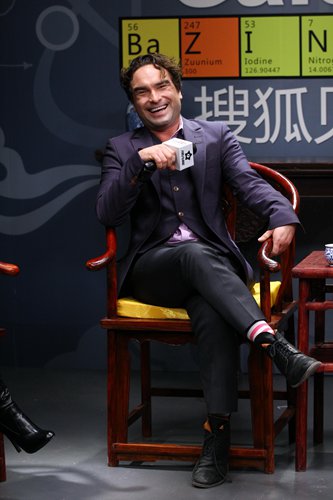
The Big Bang Theory actor Johnny Galecki attends a fan event in Beijing in 2013. (Photo: IC)
After 11 years of bringing laughter to audiences, one of the most popular US sitcoms, The Big Bang Theory, will begin airing its final season on September 24 in the US.
"We, along with the cast, writers and crew, are extremely appreciative of the show's success and aim to deliver a final season, and series finale, that will bring The Big Bang Theory to an epic creative close," read a message posted on the show's official Twitter account on Thursday.
An incredibly popular show throughout its run, the series currently is in first place on the Top Returning Comedies list for US shows from TV line, a US TV news focused website. The show also has a huge fan base overseas as well, among which Chinese audiences are probably some of the most hard-core of fans.
Upon learning the 12th season was set to be the series last, Chinese fans took to social media to express their shock and dismay.
"I knew that this day would come. I hope that everyone in the show will have a happy ending," Wuzang_miaomiao_xiaocilang commented on Sina Weibo.
"It feels like having to say goodbye to that person you love most. There is only a year left before you have to be apart," Lankong noted on Sina Weibo.
"The Big Bang Theory supported me through hard times… I feel like I'm losing a loved one or maybe worse."
'Chinese' elements
Coming from a country famous for its cuisine culture, Chinese food is seen everywhere in US TV shows and films.
The characters in the show are often shown eating Chinese takeout as they hang at home on the sofa. A large red pagoda is printed on the sides of these takeout boxes from the Fold-Pak company. The pagoda is actually the Dapuen Temple in Nanjing, capital of Jiangsu Province. A major Chinese landmark ranking right up there with the Great Wall, the Dapuen Temple was first built during 238-250 and later under underwent 19 years of reconstruction starting in 1412 during the Ming Dynasty (1368-1644).
Once the largest Buddhist temple in China, the great wonder was unfortunately badly damaged in 1854 during the Taiping Rebellion.
As the fame of the tower spread from East to West, food container manufacturer Fold-Pak company put the iconic Chinese symbol on their oyster pail takeout boxes, spreading the image of the tower throughout the US.
Besides the interesting packing box, the "typical Chinese food" depicted on the show has become a topic of discussion among Chinese netizens, since these tend to be "Chinese" dishes that are popular in the US but cannot be found in China.
In one episode in which the main character Sheldon Cooper gets involved in a feud with a Chinese restaurant that doesn't serve the tangerine chicken that he wants, Sheldon begins learning Chinese to better fight with the owner.
In one scene, Sheldon tries to say "show me your citrus peels" (Chinese: geiwokan chenpi) but ends up accidentally saying "show me your snot" (Chinese: geiwokan biti), leaving many Chinese fans dying from laughter.
This so-called tangerine chicken also caught the attention of Chinese viewers because it is a dish that cannot be found in China, its supposed country of origin.
"The food they are serving Westerners is not actual Chinese food because foreigners are not used to authentic Chinese food," Chinese netizen 39026609 noted on a post on China's Toutiao news platform.
As it turns out tangerine chicken is a US creation inspired by a dish from Hunan Province.
In the hopes of sharing "American inspired Chinese food," US Chinese restaurant chain P.F. Chang's opened a restaurant in Shanghai in April. However, the response from Chinese netizens has not been all that warm when it comes to this American-style Chinese food.
"Why would I go eat fake Chinese food in China?" read one comment on Sina Weibo.
Censorship issues
In 2014, The Big Bang Theory was removed from Chinese streaming services by the then State Administration of Press, Publication, Radio, Film and Television (SARFT) for review.
Fortunately, three months later, the show become the first US sitcom to pass SARFT review to stream in China and an edited version of the show was made available online.
Other shows that were removed during that same period, such as The Good Wife, NCIS and The Practice, were not so lucky as they never returned.
However, the new rules introduced another problem for fans of The Big Bang Theory and other foreign shows as the regulations required entire seasons of shows be reviewed before gaining permission for broadcast in China. This change meant that fans in China would face a long wait to see their favorite programs.
For instance, while the 11th season of The Big Bang Theory finished showing in the US in May, it wasn't until August 15 that all 24 episodes were released for VIP users on Chinese streaming site Sohu TV, while non-VIP users get two new episodes a week.
This seemingly hasn't impacted the show's popularity though. The currently season has earned 5,230,000 views in total over the two weeks since its release.
This delay is also certain to apply to the final 12th season, which is set to end in the US sometime in the spring. This means that Chinese fans most likely will have to wait until summer to bid their favorite characters one final goodbye.
Some fans, however, are unwilling to let go even after that.
"I am anticipating season 12. After that, I will start from season one again, so I don't ever have to say goodbye to The Big Bang Theory, noted on Sina Weibo.


